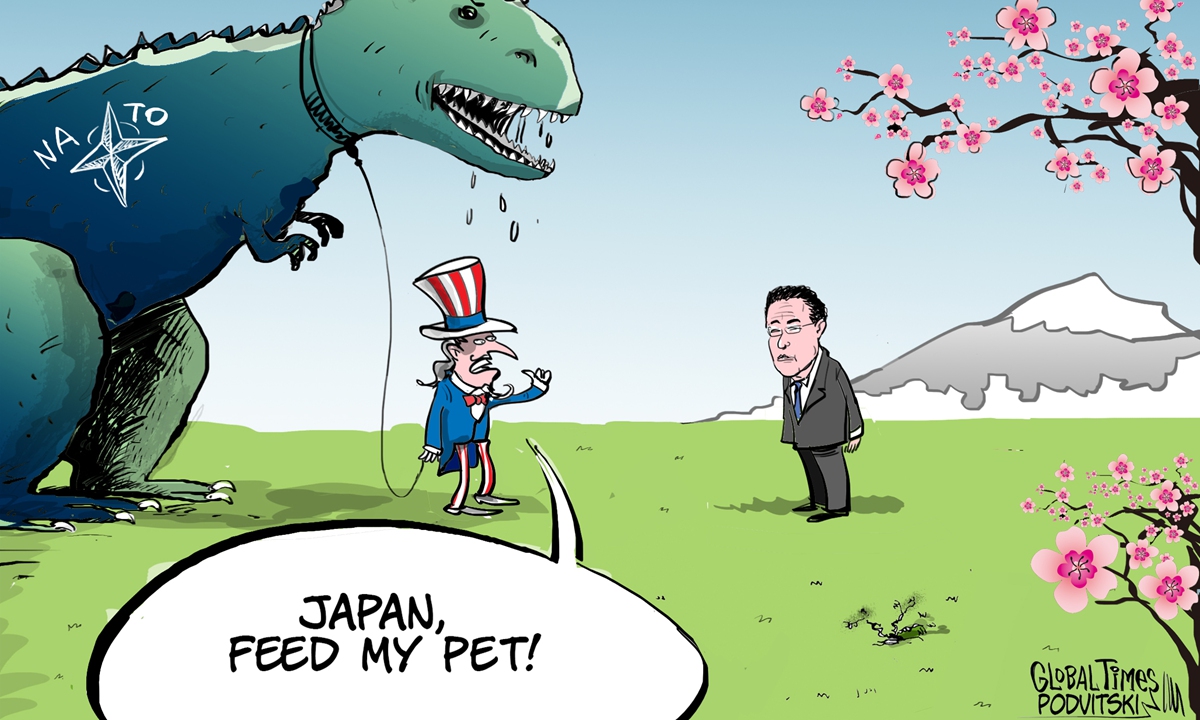
Japan, the first feeder of NATO in Asia. Cartoon: Vitaly Podvitski
French President Emmanuel Macron expressed his concerns over NATO's plan of opening an office in Tokyo, which Chinese experts on Tuesday called a "sober and brave" move as his concerns speak for more members who also oppose US' selfish agenda of dragging the alliance into Asia-Pacific which only serves the US hegemony while overburdening its members.
In sharp contrast to France's rationality, Japan has bound itself tighter to the US chariot in containing China in Asia-Pacific, including by inviting NATO to interfere in regional affairs. Experts warned that Japan will not only face fierce criticism and opposition from other regional countries, but also put itself at the frontline of attacks if conflicts escalate.
Macron's objection to NATO's Tokyo office is because he believes the transatlantic security alliance should remain focused on its own North Atlantic region, the Financial Times reported on Monday.
Macron said NATO should not expand its reach beyond the North Atlantic and added: "If . . . we push NATO to enlarge the spectrum and the geography, we will make a big mistake," FT reported.
The rejection from France has complicated months of discussion within NATO to create the alliance's first outpost in the Asia-Pacific, the Financial Times quoted eight people familiar with the situation as saying.
Similar to Macron, countries in Asia-Pacific repeatedly expressed their concerns over NATO's outreach in Asia. Speaking on Monday morning during a graduation ceremony for students, Cambodian Prime Minister Hun Sen said, "NATO only exists in the West, and now it seems to be involved in the Asia-Pacific region in various activities, bringing concerns for ASEAN," Cambodian media reported.
In response to Macron's remarks, Wang Wenbin, spokesperson of Chinese Ministry of Foreign Affairs, said at a Tuesday routine press briefing that on extending NATO's influence into the Asia-Pacific, the attitude of the majority of countries in the region is very clear. They oppose the emergence of military blocs in the region. They don't welcome NATO's outreach in Asia. They don't want a replica of bloc confrontation in Asia. And they certainly will not allow any Cold War or hot war to happen again in Asia.
Asia lies beyond the geographical scope of the North Atlantic and has no need for a replica of NATO. However, we have seen NATO bent on going east into this region, interfering in regional affairs and inciting bloc confrontation. What is NATO really up to? Wang asked.
Speaking on Sunday at the 20th Shangri-La Dialogue in Singapore, Chinese State Councilor and Minister of National Defense Li Shangfu also warned that attempts to push for NATO-like (alliances) in the Asia-Pacific is a way of kidnapping regional countries and exaggerating conflicts and confrontations and these alliances would plunge the Asia-Pacific into a whirlpool of disputes and conflicts.
It is easy to understand why the US wants NATO to outstretch to Asia-Pacific. It already got a military alliance with European countries to contain Russia in the West, and it wants a solid multilateral military alliance in the East to thwart China, Song Zhongping, a Chinese military expert and TV commentator, told the Global Times on Tuesday.
"NATO pivot in Asia obviously works for US hegemony, but what is there for other members?" Song asked.
Echoing Song, Lü Xiang, research fellow at the Chinese Academy of Social Sciences, told the Global Times on Tuesday that most European countries may resonate with France's standpoint, but they probably did not have the courage to publicly speak against the US. Macron's opposition, partly to show France's diplomatic independence, speaks for those countries to stand against the US' selfish agenda, said Lü.
Lü also pointed out that since most European countries are locked in quandary of ongoing Ukraine crisis, expanding NATO's influence may be an excessive economic and military burden for them.
In December 2022, officials in Germany walked back their previous promise of investing more than 2 percent of GDP in defense, saying such defense budget will only be met by 2025. This change is seen by US media, including the Wall Street Journal, as "imperiling" NATO's Asia pivot.
Regional non grata
Wang Wenbin said at Tuesday's press conference that NATO should keep a clear mind and that Japan should also make the right judgment that is in line with regional stability and development interests, and not do things that sabotage trust among regional countries or damage regional peace.
In an interview with CNN in May, Japanese Foreign Minister Yoshimasa Hayashi said that Japan is not a treaty member of NATO, but NATO's move to open an office in Tokyo sends a message that the bloc's Asia-Pacific partners are "engaging in a very steady manner" with NATO.
Lü believes the Tokyo office, if it opens, will only play a "symbolic role" in the short term, yet Japan's serving as a US vassal, inviting extraterritorial forces into Asia-Pacific and fanning confrontation in Asia, will receive fierce opposition from regional countries.
John Pang, a former Malaysian government official and a senior research fellow at Perak Academy in Malaysia, told the Global Times
on the sidelines of the Shangri-La Dialogue that the propagation of the NATO-like military structures in our region is based on a divisive and expansionist notion of security. This notion of security systematically provokes the security dilemma and exploits it to justify yet more militarization. This vicious cycle creates a pipeline of war for the military industrial complex.
To cope with NATO's outreach to Asia, Song Zhongping said China should strengthen diplomatic efforts with its neighboring countries, to explain to them NATO's conspiracy and plot.
China should also take tough countermeasures to any provocation from NATO, or on behalf of NATO, letting those countries to be aware that they will be at the frontline of China's counterattacks if they venture to stand on US chariot against China.




